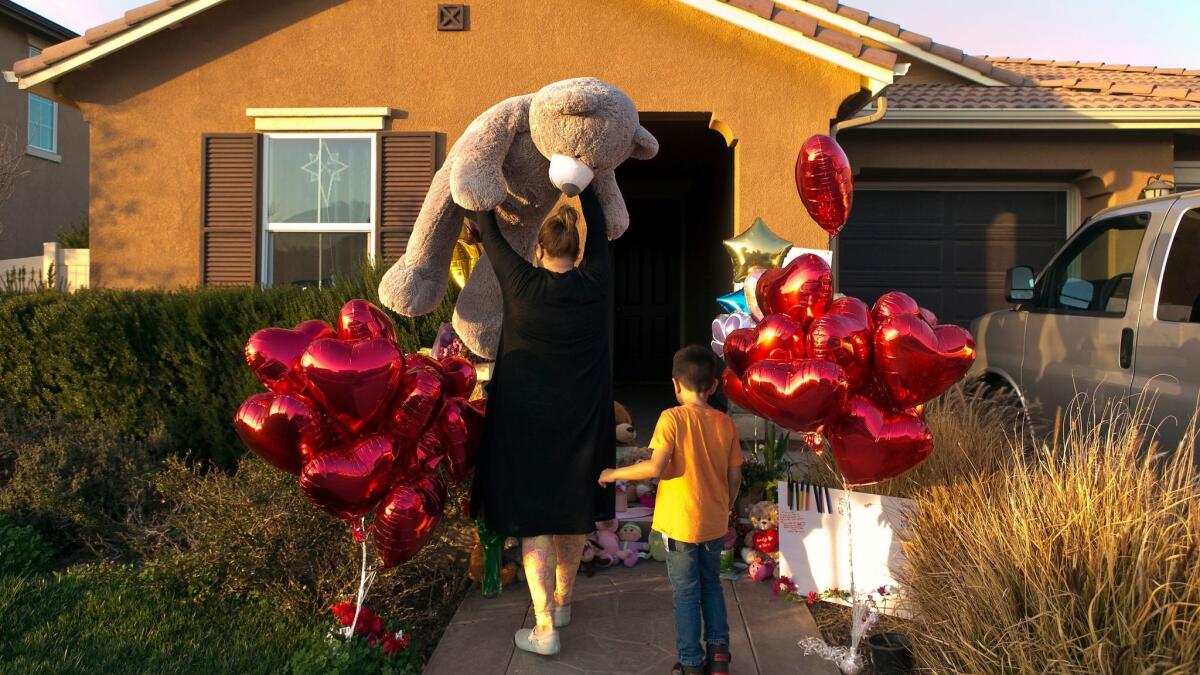Opinion: The alleged abuse of 13 children in Perris is an indictment of our neighborhoods, say readers

- Share via
Southern California has seen enough cases of the prolonged abuse and neglect of children, some resulting in deaths, that the Los Angeles Times’ letter writers recite a familiar refrain when another notable case make the news: How can the suffering of a child happen so long without effective intervention?
This time, the case of David and Louise Turpin — who are alleged to have starved and shackled their 13 children, many of whom are now adults — has caused several readers to wonder how more than a dozen people could have been hiding in squalor while living in a Perris tract home. A handful of readers have mentioned notable tragedies in the past — including that of 8-year-old Gabriel Fernandez, who died in 2013 — but instead of targeting systemic lapses, they cite a collective failure on the part of neighbors and everyday passersby to take action.
Betty Turner of Sherman Oaks goes a step further than “if you see something, say something”:
How the Turpin children’s horrific suffering could have gone unreported for so long boggles the mind.
Let us give up a little of our privacy, become a little more vulnerable and build community.
— Stephen Fischer, Los Angeles
Those 13 children’s ages range from 2 to 29. So on average, the wife gave birth to a child every other year over the span of 27 years. Yet no one thought it odd that the couple’s kids seldom if ever were seen outside the house?
It’s fine to exhort that if you see something, say something. But don’t ignore what’s implicit in that old saw: If you think you should see something, but see nothing, say something.
Burbank resident Jen Tait credits neighborliness with saving her life:
I could not help contrasting the behavior of the Turpins’ neighbors with that of my own.
In July 2016, I had a massive cerebral hemorrhage at 2 a.m., and my husband was out of town. Somehow, I managed to call 911, and the paramedics who arrived came close to leaving me at home because I was lucid.
Fortunately, my next-door neighbors were awakened and came over to investigate. They spoke to me and, upon realizing that I wasn’t myself, insisted the paramedics take me to a hospital. They even followed the ambulance to be sure I was OK. I had brain surgery the next day and spent the next three weeks on life support.
Had my neighbors not come over, my husband would have come home to find me dead. We were taught a huge lesson about being good citizens and neighbors that night — a lesson we are determined to pass on.
Stephen Fischer of Los Angeles cites Frost:
I feel the Turpin case is an indictment of the commonly misunderstood quote from “Mending Wall” by Robert Frost, “Good fences make good neighbors.”
If one reads further in the poem, we get, “Something there is that doesn’t love a wall, That wants it down.”
Let us give up a little of our privacy, become a little more vulnerable and build community. Get to know your neighbors and their children, because it matters.
Follow the Opinion section on Twitter @latimesopinion and Facebook
More to Read
A cure for the common opinion
Get thought-provoking perspectives with our weekly newsletter.
You may occasionally receive promotional content from the Los Angeles Times.










